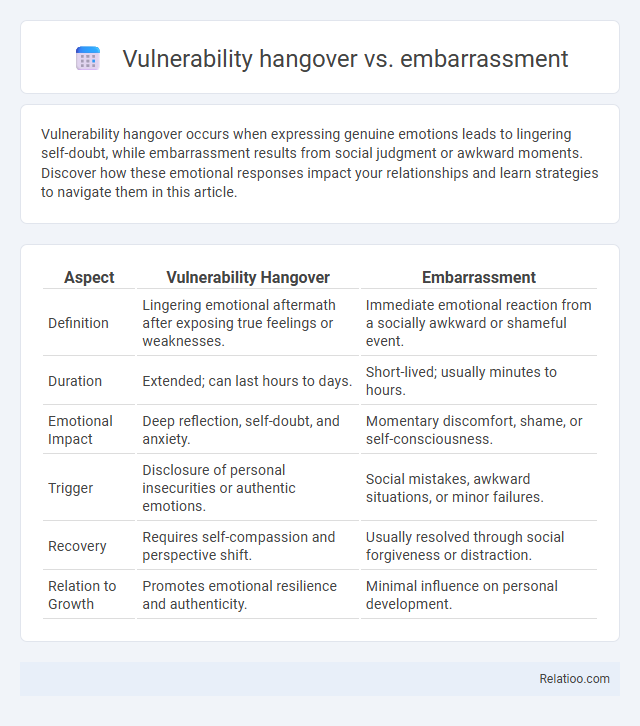Vulnerability hangover occurs when expressing genuine emotions leads to lingering self-doubt, while embarrassment results from social judgment or awkward moments. Discover how these emotional responses impact your relationships and learn strategies to navigate them in this article.
Table of Comparison
| Aspect | Vulnerability Hangover | Embarrassment |
|---|---|---|
| Definition | Lingering emotional aftermath after exposing true feelings or weaknesses. | Immediate emotional reaction from a socially awkward or shameful event. |
| Duration | Extended; can last hours to days. | Short-lived; usually minutes to hours. |
| Emotional Impact | Deep reflection, self-doubt, and anxiety. | Momentary discomfort, shame, or self-consciousness. |
| Trigger | Disclosure of personal insecurities or authentic emotions. | Social mistakes, awkward situations, or minor failures. |
| Recovery | Requires self-compassion and perspective shift. | Usually resolved through social forgiveness or distraction. |
| Relation to Growth | Promotes emotional resilience and authenticity. | Minimal influence on personal development. |
Understanding Vulnerability Hangover
Understanding vulnerability hangover involves recognizing the emotional aftermath experienced after sharing personal or sensitive information, which can lead to feelings of regret, anxiety, or shame. Unlike embarrassment that typically arises from social awkwardness or minor mistakes, vulnerability hangover stems from deeper fears of judgment or rejection. Addressing vulnerability hangover requires self-compassion and reflection to differentiate between actual negative feedback and internal fears.
What Is Embarrassment?
Embarrassment is a self-conscious emotional response triggered by perceived social awkwardness, mistakes, or failures that threaten one's self-image or social standing. Unlike vulnerability hangover, which stems from the lingering regret or anxiety after exposing personal feelings or insecurities, embarrassment specifically involves acute discomfort and self-awareness in social interactions. Understanding embarrassment is crucial for distinguishing it from the prolonged emotional effects of vulnerability hangover, as embarrassment typically arises from immediate social scrutiny or judgment.
Key Differences: Vulnerability Hangover vs Embarrassment
Vulnerability hangover is the lingering emotional aftermath of exposing one's true feelings or imperfections, often causing self-doubt and emotional fatigue, while embarrassment is a temporary discomfort typically triggered by social mistakes or awkward moments. Unlike embarrassment, which usually fades quickly after the situation passes, vulnerability hangover can persist, impacting self-esteem and willingness to be open. The key difference lies in vulnerability hangover's deeper reflection on personal authenticity, whereas embarrassment centers on external social judgment.
Psychological Causes of Vulnerability Hangover
Psychological causes of vulnerability hangover include feelings of regret, shame, and self-doubt that arise after exposing your true emotions or weaknesses. Unlike embarrassment, which is often a temporary reaction to social awkwardness, vulnerability hangover stems from deeper cognitive patterns related to fear of judgment and perceived loss of control. Your mind replays these moments, amplifying emotional distress and hindering self-acceptance and resilience.
Triggers That Lead to Embarrassment
Triggers that lead to embarrassment often stem from social mishaps, such as making mistakes in public or receiving unexpected criticism, which activate the brain's amygdala and heighten self-consciousness. Vulnerability hangover occurs when one reflects on these moments, experiencing prolonged emotional discomfort and regret that surpasses the initial embarrassment. Unlike embarrassment, a vulnerability hangover involves deeper self-evaluation and increased sensitivity to perceived judgment, often fueled by ruminative thoughts and fear of social rejection.
Emotional Impact: Short-term and Long-term Effects
Vulnerability hangover causes lingering emotional exhaustion and anxiety that can impact your confidence and social interactions long after the vulnerable moment has passed. Embarrassment typically triggers a brief, intense emotional reaction such as shame or self-consciousness, which fades quickly without long-term psychological effects. The emotional impact of vulnerability hangover combines immediate discomfort with potential long-term effects like decreased self-esteem and trust issues, while embarrassment mainly disrupts your momentary sense of emotional balance.
Coping Strategies for Vulnerability Hangover
Experiencing a vulnerability hangover often involves lingering feelings of regret or self-doubt after exposing your true self, whereas embarrassment typically centers on social discomfort tied to a specific incident. To cope with a vulnerability hangover, your best strategies include self-compassion practices, journaling to process emotions, and seeking supportive conversations that validate your experience. Recognizing that vulnerability hangovers are temporary allows you to build resilience and deepen emotional connections over time.
How to Handle Embarrassment Effectively
Handling embarrassment effectively involves recognizing its temporary nature and reframing the experience as a learning opportunity. You can manage vulnerability hangover, the lingering discomfort after sharing personal truths, by practicing self-compassion and focusing on positive feedback rather than negative self-judgment. Developing mindfulness techniques and building emotional resilience helps reduce the intensity of both embarrassment and vulnerability hangovers, enabling personal growth and stronger social connections.
Building Resilience Against Shame and Vulnerability
Vulnerability hangover, characterized by lingering shame after exposing personal weaknesses, significantly impacts emotional well-being. Embarrassment tends to be more transient and surface-level, whereas vulnerability hangover involves deeper feelings of rejection and self-doubt. Building resilience against shame and vulnerability requires cultivating self-compassion, practicing emotional regulation, and developing supportive relationships to transform these experiences into growth opportunities.
When to Seek Help: Managing Overwhelming Emotions
Experiencing a vulnerability hangover--a lingering sense of regret or emotional exhaustion after sharing personal feelings--differs from embarrassment, which is a short-lived discomfort tied to social awkwardness. When overwhelming emotions persist, interfere with daily functioning, or trigger anxiety and depression, seeking help from mental health professionals is essential for effective management. Addressing vulnerability hangovers early through therapy or counseling can prevent emotional burnout and promote resilience in future vulnerable experiences.

Infographic: Vulnerability hangover vs embarrassment
 relatioo.com
relatioo.com